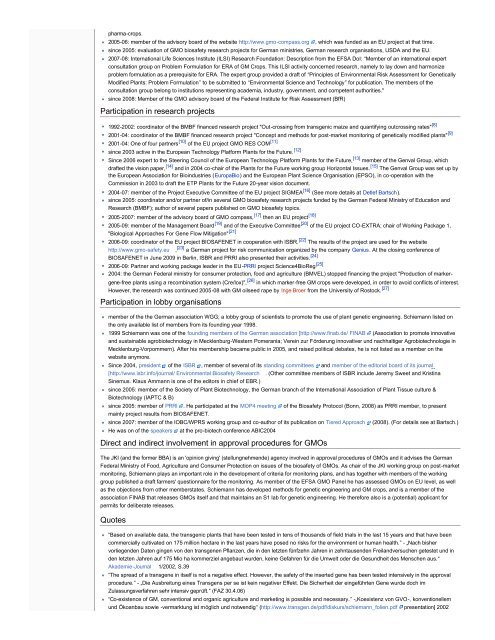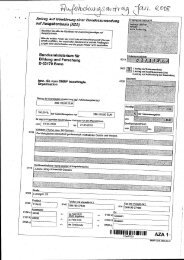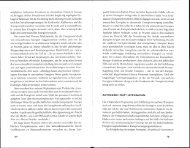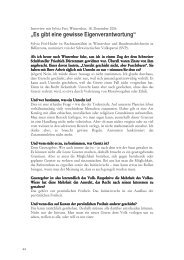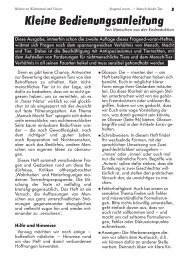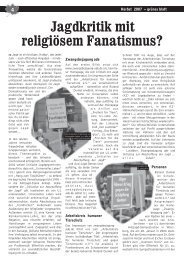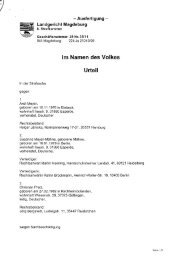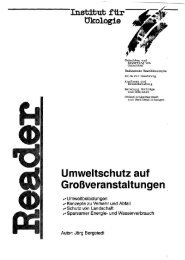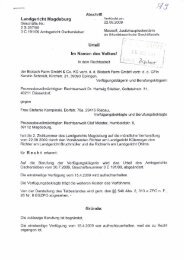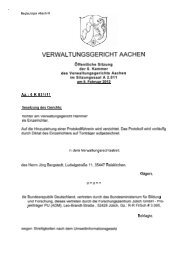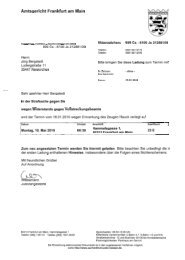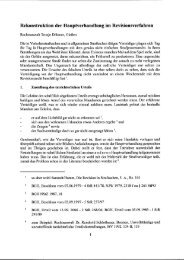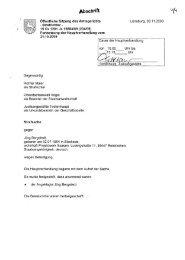Fußnoten und weiteren Quellen - Projektwerkstatt
Fußnoten und weiteren Quellen - Projektwerkstatt
Fußnoten und weiteren Quellen - Projektwerkstatt
Erfolgreiche ePaper selbst erstellen
Machen Sie aus Ihren PDF Publikationen ein blätterbares Flipbook mit unserer einzigartigen Google optimierten e-Paper Software.
assessment of genetically modified plants used as a production platform for nonfood products, and Self task on nontarget organisms (GMO).<br />
200406: member of the EFSA working group Postmarket Environmental Monitoring (PMEM) that among others developed questionnaires for<br />
postmarket monitoring.<br />
since 2004: trustee of the Fraunhofer Institute for Molecular Biology and Applied Ecology (IME). Among other projects the IME also develops GM<br />
pharmacrops.<br />
200506: member of the advisory board of the website http://www.gmocompass.org , which was f<strong>und</strong>ed as an EU project at that time.<br />
since 2005: evaluation of GMO biosafety research projects for German ministries, German research organisations, USDA and the EU.<br />
200708: International Life Sciences Institute (ILSI) Research Fo<strong>und</strong>ation: Description from the EFSA DoI: “Member of an international expert<br />
consultation group on Problem Formulation for ERA of GM Crops. This ILSI activity concerned research, namely to lay down and harmonize<br />
problem formulation as a prerequisite for ERA. The expert group provided a draft of “Principles of Environmental Risk Assessment for Genetically<br />
Modified Plants: Problem Formulation” to be submitted to “Environmental Science and Technology” for publication. The members of the<br />
consultation group belong to institutions representing academia, industry, government, and competent authorities."<br />
since 2008: Member of the GMO advisory board of the Federal Institute for Risk Assessment (BfR)<br />
Participation in research projects<br />
19922002: coordinator of the BMBF financed research project "Outcrossing from transgenic maize and quantifying outcrossing rates" [8]<br />
200104: coordinator of the BMBF financed research project "Concept and methods for postmarket monitoring of genetically modified plants" [9]<br />
200104: One of four partners [10] of the EU project GMO RES COM [11]<br />
since 2003 active in the European Technology Platform Plants for the Future. [12]<br />
Since 2006 expert to the Steering Council of the European Technology Platform Plants for the Future, [13] member of the Genval Group, which<br />
drafted the vision paper, [14] and in 2004 cochair of the Plants for the Future working group Horizontal Issues. [15] The Genval Group was set up by<br />
the European Association for Bioindustries (EuropaBio) and the European Plant Science Organisation (EPSO), in cooperation with the<br />
Commission in 2003 to draft the ETP Plants for the Future 20year vision document.<br />
200407: member of the Project Executive Committee of the EU project SIGMEA [16] (See more details at Detlef Bartsch).<br />
since 2005: coordinator and/or partner of/in several GMO biosafety research projects f<strong>und</strong>ed by the German Federal Ministry of Education and<br />
Research (BMBF); author of several papers published on GMO biosafety topics.<br />
20052007: member of the advisory board of GMO compass, [17] then an EU project [18]<br />
200509: member of the Management Board [19] and of the Executive Committee [20] of the EU project COEXTRA; chair of Working Package 1,<br />
"Biological Approaches For Gene Flow Mitigation" [21]<br />
200609: coordinator of the EU project BIOSAFENET in cooperation with ISBR. [22] The results of the project are used for the website<br />
http://www.gmosafety.eu , [23] a German project for risk communication organized by the company Genius. At the closing conference of<br />
BIOSAFENET in June 2009 in Berlin, ISBR and PRRI also presented their activities. [24]<br />
200609: Partner and working package leader in the EUPRRI project Science4BioReg [25]<br />
2004: the German Federal ministry for consumer protection, food and agriculture (BMVEL) stopped financing the project "Production of marker<br />
genefree plants using a recombination system (Cre/lox)", [26] in which markerfree GM crops were developed, in order to avoid conflicts of interest.<br />
However, the research was continued 200508 with GM oilseed rape by Inge Broer from the University of Rostock. [27]<br />
Participation in lobby organisations<br />
member of the the German association WGG; a lobby group of scientists to promote the use of plant genetic engineering. Schiemann listed on<br />
the only available list of members from its fo<strong>und</strong>ing year 1998.<br />
1999 Schiemann was one of the fo<strong>und</strong>ing members of the German association [http://www.finab.de/ FINAB (Association to promote innovative<br />
and sustainable agrobiotechnology in MecklenburgWestern Pomerania; Verein zur Förderung innovativer <strong>und</strong> nachhaltiger Agrobiotechnologie in<br />
MecklenburgVorpommern). After his membership became public in 2005, and raised political debates, he is not listed as a member on the<br />
website anymore.<br />
Since 2004, president of the ISBR , member of several of its standing committees and member of the editorial board of its journal<br />
[http://www.isbr.info/journal/ Environmental Biosafety Research . (Other committee members of ISBR include Jeremy Sweet and Kristina<br />
Sinemus. Klaus Ammann is one of the editors in chief of EBR.)<br />
since 2005: member of the Society of Plant Biotechnology, the German branch of the International Association of Plant Tissue culture &<br />
Biotechnology (IAPTC & B)<br />
since 2005: member of PRRI . He participated at the MOP4 meeting of the Biosafety Protocol (Bonn, 2008) as PRRI member, to present<br />
mainly project results from BIOSAFENET.<br />
since 2007: member of the IOBC/WPRS working group and coauthor of its publication on Tiered Approach (2008). (For details see at Bartsch.)<br />
He was on of the speakers at the probiotech conference ABIC2004<br />
Direct and indirect involvement in approval procedures for GMOs<br />
The JKI (and the former BBA) is an 'opinion giving' (stellungnehmende) agency involved in approval procedures of GMOs and it advises the German<br />
Federal Ministry of Food, Agriculture and Consumer Protection on issues of the biosafety of GMOs. As chair of the JKI working group on postmarket<br />
monitoring, Schiemann plays an important role in the development of criteria for monitoring plans, and has together with members of the working<br />
group published a draft farmers' questionnaire for the monitoring. As member of the EFSA GMO Panel he has assessed GMOs on EU level, as well<br />
as the objections from other memberstates. Schiemann has developed methods for genetic engineering and GM crops, and is a member of the<br />
association FINAB that releases GMOs itself and that maintains an S1 lab for genetic engineering. He therefore also is a (potential) applicant for<br />
permits for deliberate releases.<br />
Quotes<br />
“Based on available data, the transgenic plants that have been tested in tens of thousands of field trials in the last 15 years and that have been<br />
commercially cultivated on 175 million hectare in the last years have posed no risks for the environment or human health.” „Nach bisher<br />
vorliegenden Daten gingen von den transgenen Pflanzen, die in den letzten fünfzehn Jahren in zehntausenden Freilandversuchen getestet <strong>und</strong> in<br />
den letzten Jahren auf 175 Mio ha kommerziel angebaut wurden, keine Gefahren für die Umwelt oder die Ges<strong>und</strong>heit des Menschen aus.“<br />
AkademieJournal 1/2002, S.39<br />
“The spread of a transgene in itself is not a negative effect. However, the safety of the inserted gene has been tested intensively in the approval<br />
procedure.” „Die Ausbreitung eines Transgens per se ist kein negativer Effekt. Die Sicherheit der eingeführten Gene wurde doch im<br />
Zulassungsverfahren sehr intensiv geprüft.“ (FAZ 30.4.06)<br />
“Coexistence of GM, conventional and organic agriculture and marketing is possible and necessary.” „Koexistenz von GVO, konventionellem<br />
<strong>und</strong> Ökoanbau sowie vermarktung ist möglich <strong>und</strong> notwendig“ (http://www.transgen.de/pdf/diskurs/schiemann_folien.pdf presentation] 2002<br />
Patents and intellectual properties issues<br />
1996 Schiemann filed the patent WO 98016824 as inventor and owner on genetically manipulated plants with fluorescent proteins. Goal of the genetic


